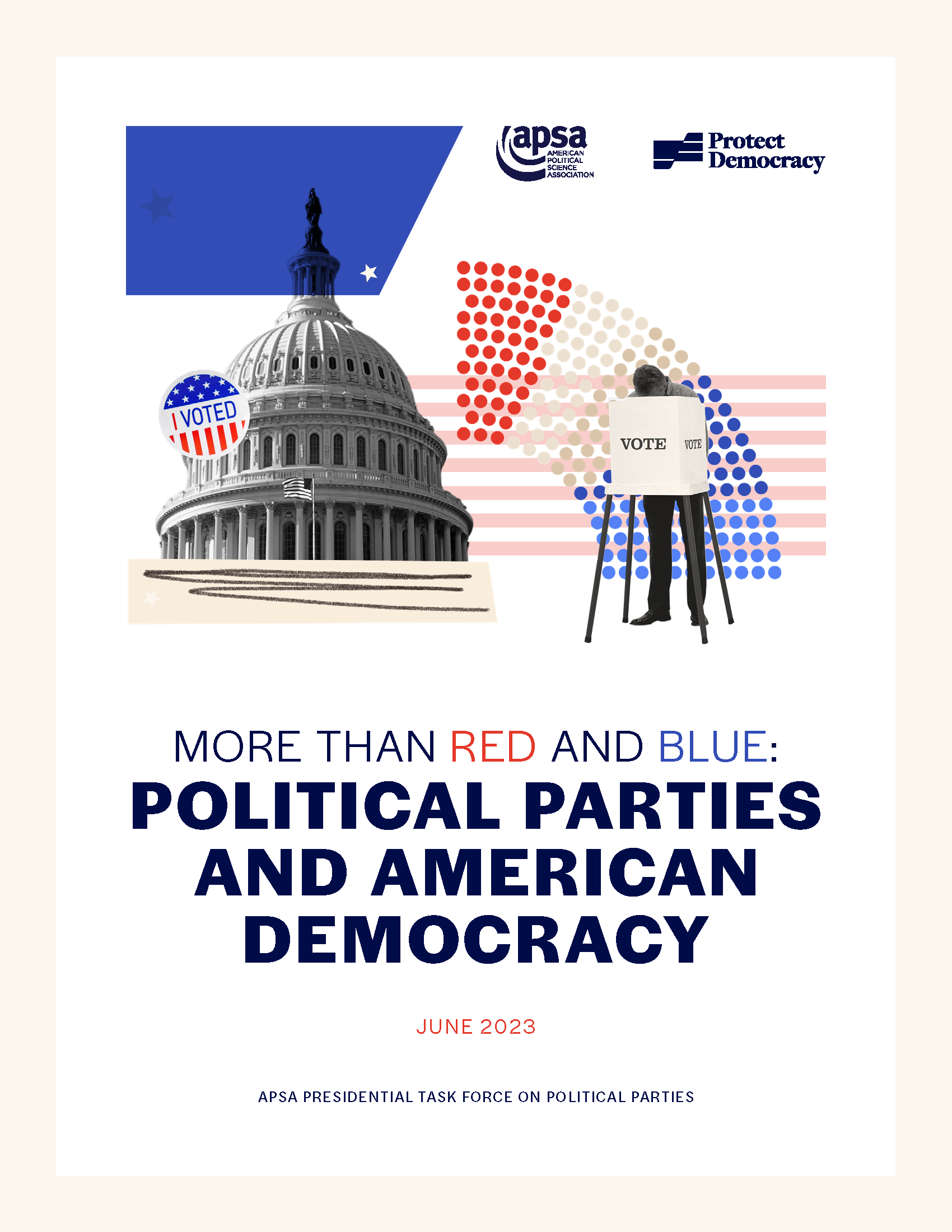
APSA Presidential Task Force Report: More than Red and Blue: Political Parties and American Democracy
Released by the American Political Science Association (APSA) and Protect Democracy, More than Red and Blue: Political Parties and American Democracy, identifies how today’s political parties are exacerbating many of the country’s central political problems. Skepticism of political parties is a central feature of American political culture and only about 11% of Americans express high confidence in political parties – igniting APSA’s desire to identify why. Ultimately, the research supports a surprising conclusion: there’s a near-consensus among scholars that healthy political parties are essential to a stable democracy, and without change our politics will likely continue to deteriorate.
The gravity of democracy challenges in the U.S. spurred APSA to establish a task force of 13 of America’s leading scholars on political parties and partisanship, chaired by David Lublin (American University) and Lilliana Mason (Johns Hopkins University). The task force’s report synthesizes decades of expert research on political parties: what they do in democracies, why American parties are failing to behave responsibly, and what evidence tells us about their future.
Read full report
|
|
APSA Presidential Task Force Report on New Partnerships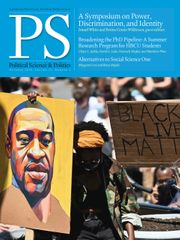
In 2018, the Ivywood Foundation made a gift of $1,200,000 in funding to the American Political Science Association to support the Presidential Task Force on New Partnerships. APSA President-Elect Rogers Smith charged the Task Force to consider how best to expand political science’s relevance and reach in an era of growing specialization and a widening gap between research- and teaching-focused institutions, as well as increasing ideological polarization, mistrust of civic institutions, and public skepticism of science and expertise. This report documents the progress of task force members and APSA staff for the funding period of October 1, 2018 through September 30, 2019. It provides a narrative of the project tasks, accomplishments, and outlook for the future. A financial report summarizing actual project expenditures through September 30, 2019 is included.
Read
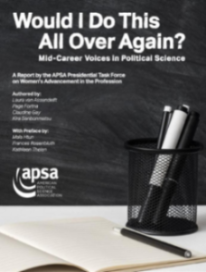
Would I Do This All Over Again? Mid-Career Voices in Political Science
This report by the APSA Presidential Task Force on Women’s Advancement in the Profession is based on personal and confidential semi-structured interviews with individuals from three graduate programs who entered graduate school around the same time (the early 1990s) about their educational and career experiences from the decision to pursue the PhD to the present—regardless of whether or not the individuals completed the degree or work in the profession today. How do people experience the profession of political science? What explains differences in individual trajectories—both within and outside the academy? How do climate, efforts to diversify the academy, and policies such as family leave impact individual careers? What policies and practices help graduate students on the job market, and faculty on the tenure-track? What are the tradeoffs in academic and non-academic pursuits? And what is the value of the PhD—inside and outside the academy?
Read
Buy
|
|
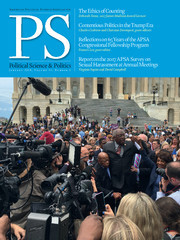
Report on the 2017 APSA Survey on Sexual Harassment at Annual Meetings (2018)
In light of concerns about sexual harassment within the political science profession, the APSA Professional Ethics, Rights, and Freedoms Committee surveyed the entire APSA membership between February and March 2017 to determine the extent and nature of perceived harassment experience at APSA Annual Meetings. The results were intended to complement the recent institution of the new APSA anti-harassment policy to find out what, if any, further courses of action might be warranted.
Read
|
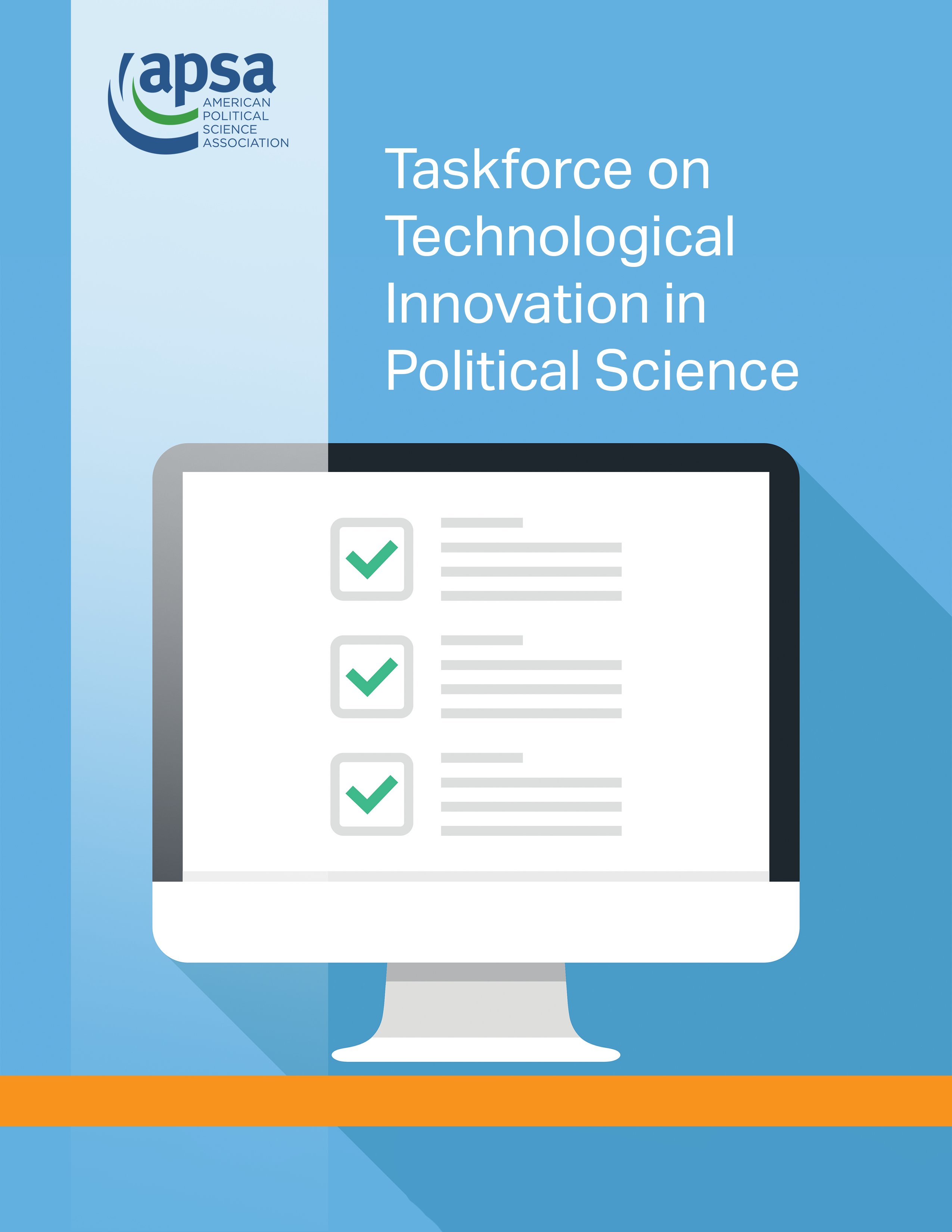
Technological Innovation in Political Science (2017)
The American Political Science Association (APSA) Taskforce on Technological Innovation in Political Science conducted a series of meetings and conference calls to examine ways that APSA and its members can encourage technology innovations in teaching, research, and public outreach. The taskforce formed a set of subcommittees, and each group generated a number of ideas, which are briefly summarized in the following text. The taskforce also conducted a survey of APSA members regarding their technology use. Following these recommendations are longer subcommittee reports outlining the rationale for these recommendations.
Read
|
|
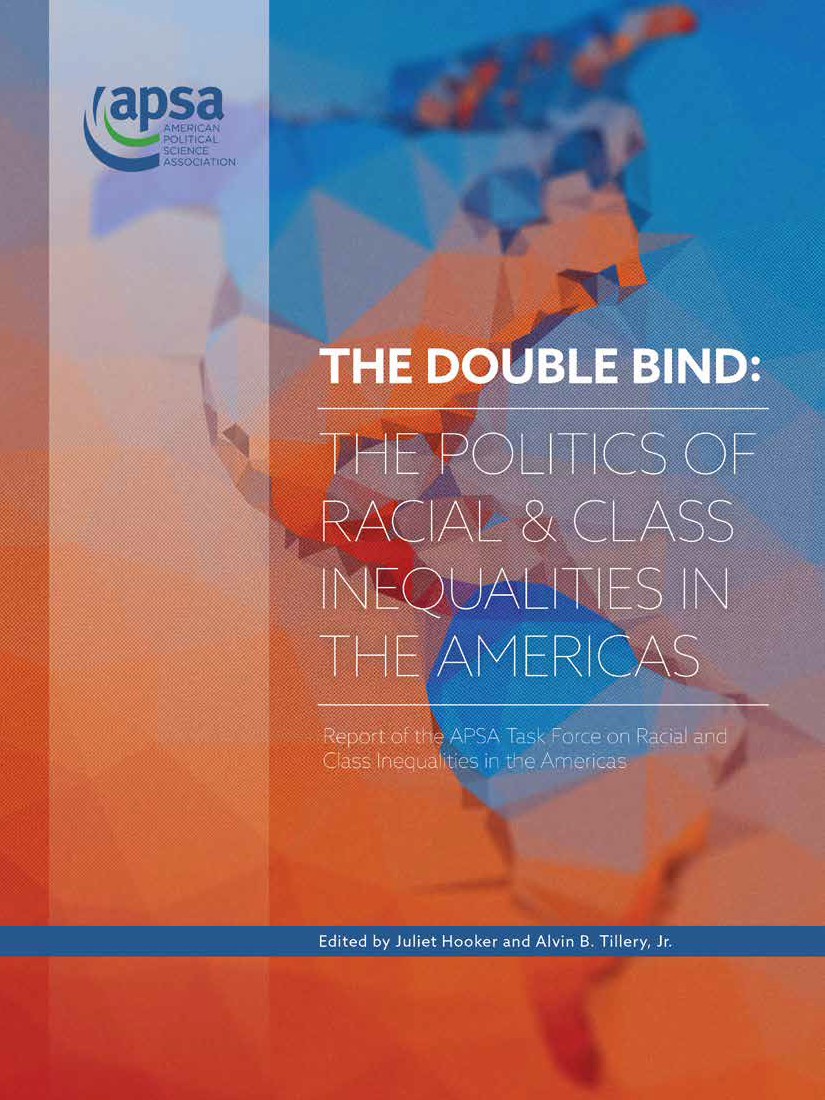
The Double Bind: The Politics of Racial and Class Inequalities in the Americas (2016)
Although political science has studied how rising income inequality affects political representation, the Task Force on Racial and Class Inequalities in the Americas focuses specifically on the causes and consequences of inequality in its various forms. The long-standing gaps in the life chances of whites and communities of color in the nations of the Americas have been largely unexplored. At the same time, in Latin America, which had long denied the existence of a relationship between race and ethnicity and class disparities, there has been an explosion in data-gathering on race and ethnicity and in particular on the relationship between race and inequality. Therefore, the task force members have explicitly sought to grapple with both the problem of rising socioeconomic inequality and the multifaceted racial gaps that exist throughout the Americas.
Spanish
English
|
|
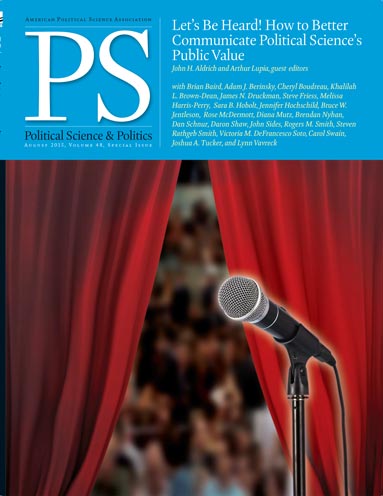
Let's Be Heard! How to Better Communicate Political Science's Public Value (2015)
Political science is at a crossroads. The knowledge that it produces is more diverse and valuable than ever before—yet many audiences do not understand why or how political science is beneficial. Moreover, the rise of the internet has changed the kinds of information that people seek. For many scholars, the question has become “How do we make our knowledge accessible and relevant to others while still retaining our high standards of scholarship and teaching?
Read
|
|
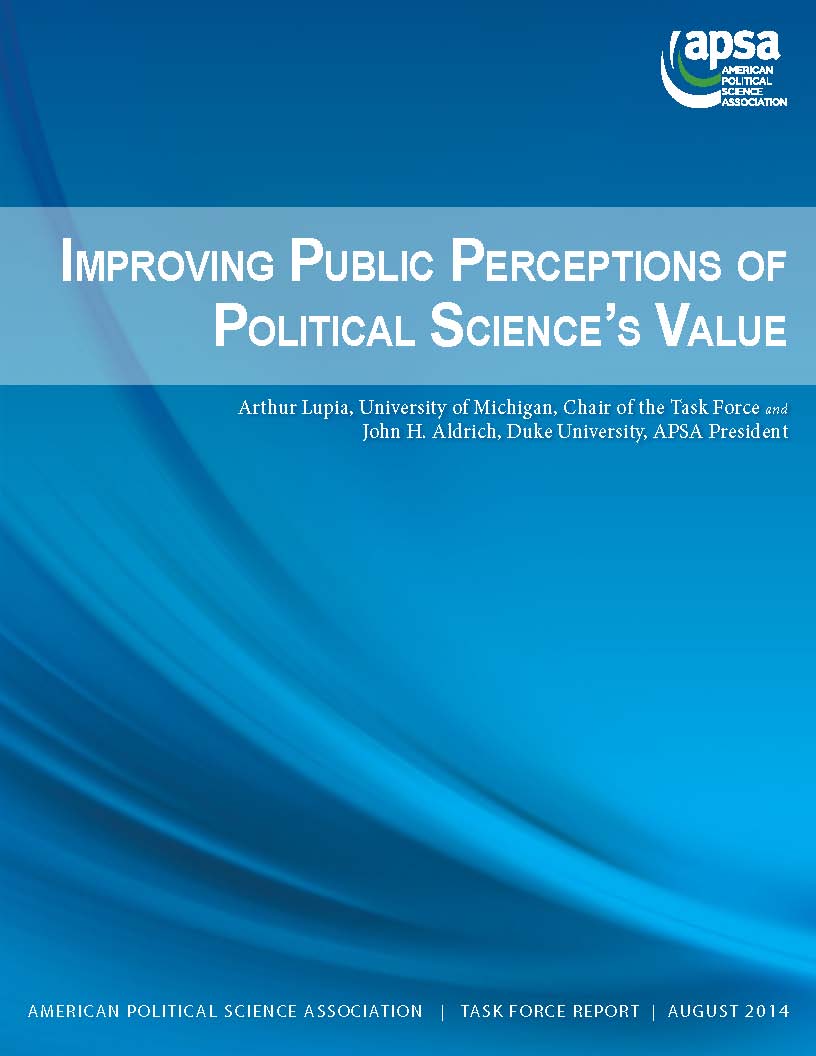
Improving Public Perceptions of Political Science's Value (2014)
This report to the APSA Council discusses how Political Science as a corporate entity engages in two principal tasks—the creation of knowledge and the dissemination of knowledge. Creation of knowledge is, at base, a product of the actions of individual scholars and small scholarly groups. And many of the ways in which political scientists currently communicate—through their teaching, publication in journals, and conference presentations – were developed in less competitive communicative eras. To remain relevant, we must adapt. But how?
Read
|
|
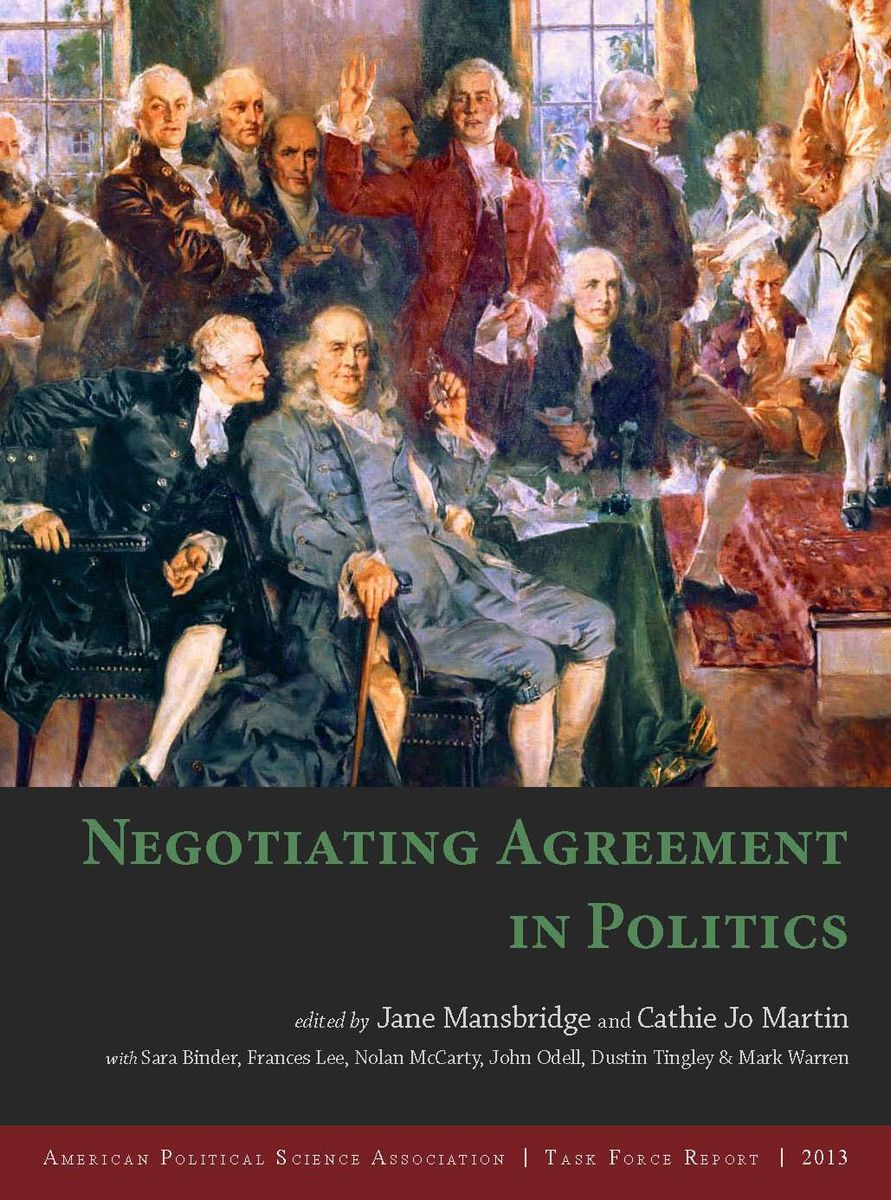
Negotiating Agreement in Politics (2013)
The breakdown of political negotiation within Congress today is puzzling in several important respects. The United States used to be viewed as a land of broad consensus and pragmatic politics in which sharp ideological differences were largely absent; yet, today, politics is dominated by intense party polarization and limited agreement among representatives on policy problems and solutions. Americans pride themselves on their community spirit, civic engagement, and dynamic society, yet we are handicapped by our national political institutions, which often-but not always-stifle the popular desire for policy innovation and political reforms. The separation of powers helps to explain why Congress has a difficult time taking action, but many countries that have severe institutional hurdles to easy majoritarian rule still produce political deals.
Read
|
|
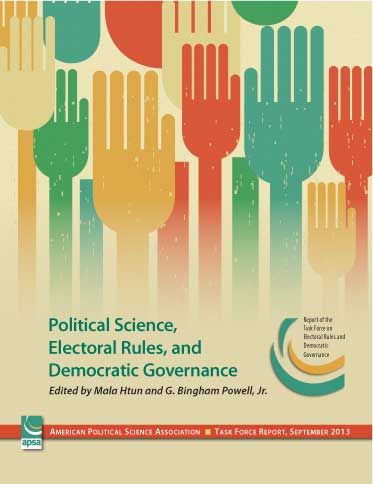
Political Science, Electoral Rules, and Democratic Governance (2013)
Political scientists have contributed to the world of electoral systems as scientists and as engineers. Taking stock of recent scientific research, this report shows that context modifies the effects of electoral rules on political outcomes in specific and systematic ways. It explores how electoral rules shape party systems, the inclusion of women and minorities, the depth and nature of political competition, and patterns of redistribution and regulation. It considers institutional innovations that could promote political equality. Finally, the report describes the diverse ways that political scientists are producing an impact on the world by sharing and applying their knowledge of the consequences of electoral rules and global trends in reform.
Read
|
|
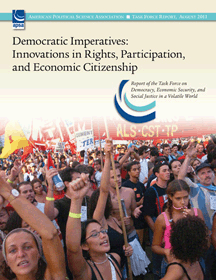
Democratic Imperatives: Innovations in Rights, Participation, and Economic Citizenship (2012)
The charge of the Task Force on Democracy, Economic Security, and Social Justice in a Volatile World is to rethink some of the familiar assumptions about democracy, economic security, and social justice in light of these worrisome trends. Its aim is to refresh and reinvigorate debates on the articulation between democracy, economic security, and social justice in developed and developing countries. In particular, the Task Force will assess recent policy innovations in three broad, related areas: basic income, participatory budgeting and planning, and rights-based models of welfare and development.
Read
|
|
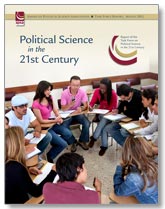
Political Science in the 21st Century (2011)
This report examines the profession of political science to determine whether it is living up to its full potential as a scholarly discipline by enriching the discourse, broadening the understanding, and modeling the behavior reflective of vibrant democracy. Is political science positioned to embrace and incorporate the changing demographics, increasing multicultural diversity, and ever-growing disparities in the concentration of wealth present in many nation-states? Can political science do so within its research, teaching, and professional development?
Read
|
|
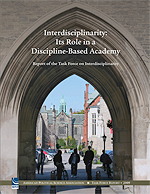
Interdisciplinarity: Its Role in a Discipline-Based Academy (2009)
This summary report of the APSA Task Force on Interdisciplinarity focuses on procedural aspects of interdisciplinary practices currently in use, including incentives, organizational structures, and techniques to educate students and scholars to work effectively in interdisciplinary approaches. The intent is to provide a guide to promising innovations that have worked well, rather than to judge which ones might be the best. Best practices are presented from a wide range of academic fields and institutions. The report is intended to be helpful to an equally wide range of academicians, including research and teachers themselves, and the directors of institutional structures that shape the research and teaching environment.
Read
|
|
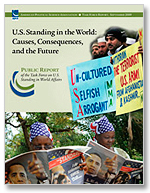
U.S. Standing in the World: Causes, Consequences, and the Future (2009)
America’s global standing has become a central concern of U.S. leaders and citizens. U.S. leaders, regardless of party, pledge to “restore U.S. standing” as a central goal of America’s foreign policy agenda. Standing has been the subject of widespread public discussion and intellectual debate. Yet despite all this attention, three issues fundamental to standing have been relatively ignored
- What is standing and how has it varied?
- What causes standing to rise and fall?
- What impact does standing have on U.S. foreign policy?
This report of the Task Force on U.S. Standing in World Affairs answers these questions by synthesizing what we now know about U.S. standing and/or identifying what we need to know to understand better a topic of clear national and international importance.
Read
|
|
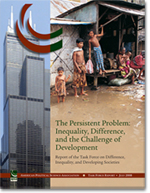
The Persistent Problem: Inequality, Difference, and the Challenge of Development (2008)
This report, from the APSA Task Force on Difference, Inequality, and Developing Societies, highlights the complex, multidimensional nature of inequality in the era of globalization, and documents that despite the impressive strides by nations like China and India, absolute inequality between the richest and poorest countries is greater than ever before in history. This report’s central argument is that, under conditions of high inequality, elites—both international and within individual nations—may create socially sub-optimal institutions and policies, and they may resist changes that promote development but threaten their dominance.
Read
|
|
Taskforce on Political Violence and Terrorism (2007)
The objective of the APSA Task Force on Political Violence and Terrorism is to assess the contribution of political science to the understanding of how trends in civil violence affect domestic and international political order and to share findings with the public.
Read
|
|
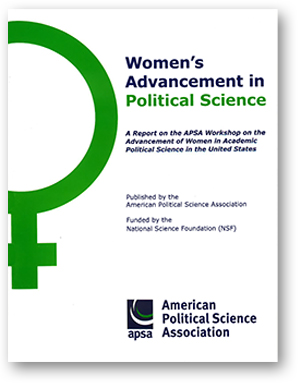
women's advancement in political science (2005)
This report addresses broad problem of under-representation of women in the academic ranks of political scientists in the United States. Despite substantial gains at all academic ranks since the 1970s, women seem likely to remain below parity with men in the discipline for some time to come. It also describes next steps and actions for national and regional professional associations, institutions, departments, and senior faculty.
Read
|
|
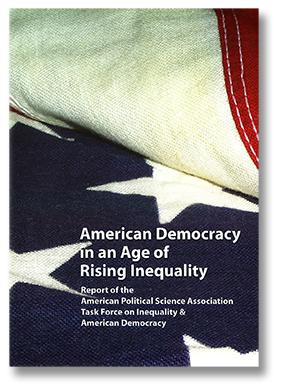
American Democracy in an Age of Inequality (2004)
Equal political voice and democratically responsive government are widely cherished American ideals. Indeed, the United States is vigorously promoting democracy abroad. Yet, what is happening to democracy at home? Our country’s ideals of equal citizenship and responsive government may be under growing threat in an era of persistent and rising inequalities. Disparities of income, wealth, and access to opportunity are growing more sharply in the United States than in many other nations, and gaps between races and ethnic groups persist. This report describes how progress toward realizing American ideals of democracy may have stalled, and in some arenas reversed.
Read
|
|
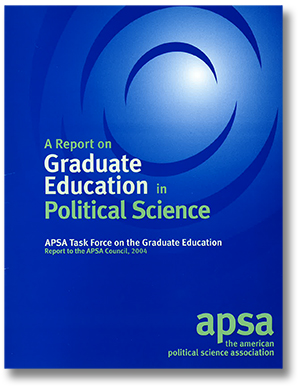
Graduate Education in Political Science (2004)
This report describes the basic principles, and their rationales, that all graduate programs could and should seek to embody, even if in widely differing forms, and the steps that departments and the APSA can undertake, and often need to undertake, to fulfill these principles in ways that fit their circumstances. It reviews a series of options for individual departments, institutions, and the APSA.
Read
|
|
Workplace and Family Issues Report (2004)
This report investigates the pressures and challenges facing those who attempt to have both a family and a career. While these challenges will affect all faculty members at some point in their careers—men and women, young and old—studies show that the burdens fall more squarely on some than on others, and women still pay the price to a greater extent than do men. It describes the numerous obstacles to making the academic workplace more family friendly, and the resources, coordination, and shift in academic culture that may be required to overcome these.
Read
|